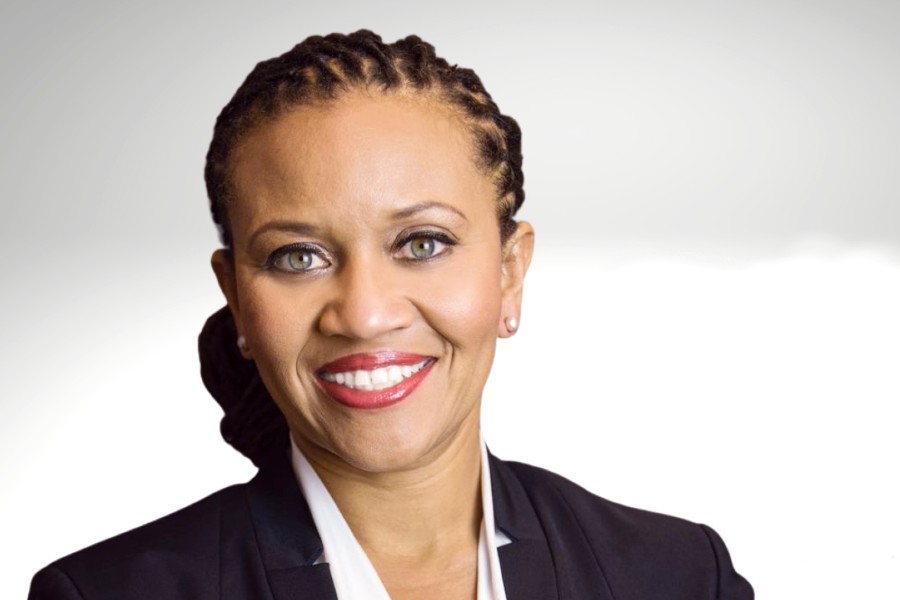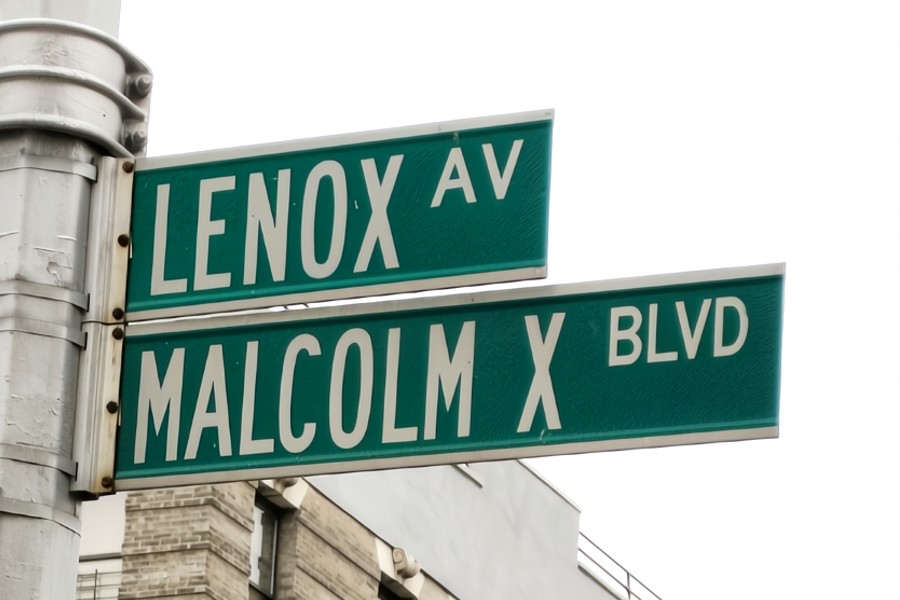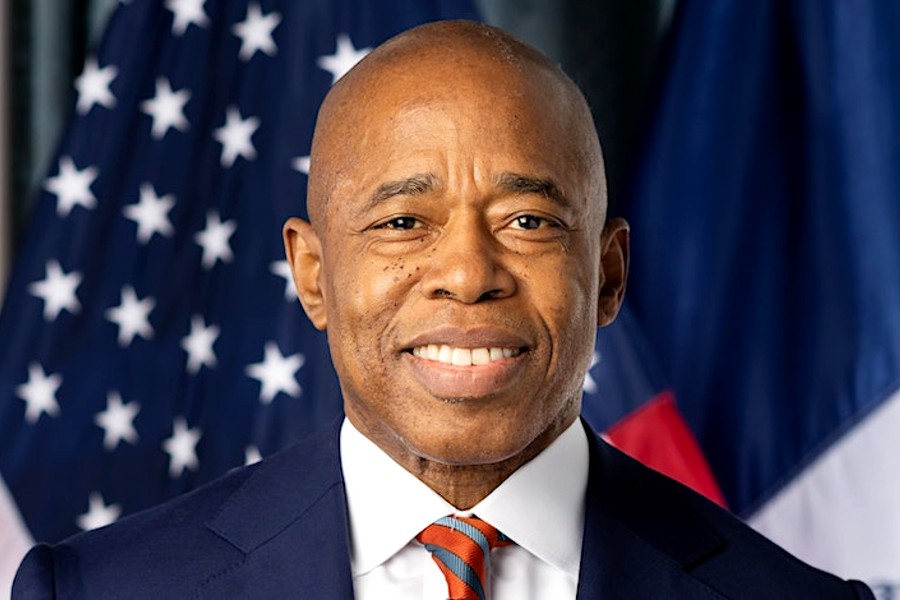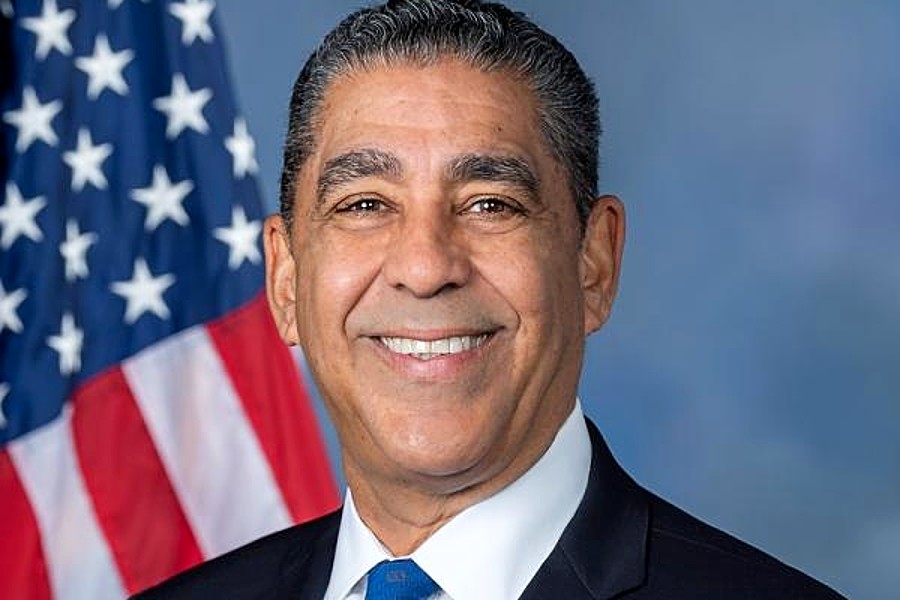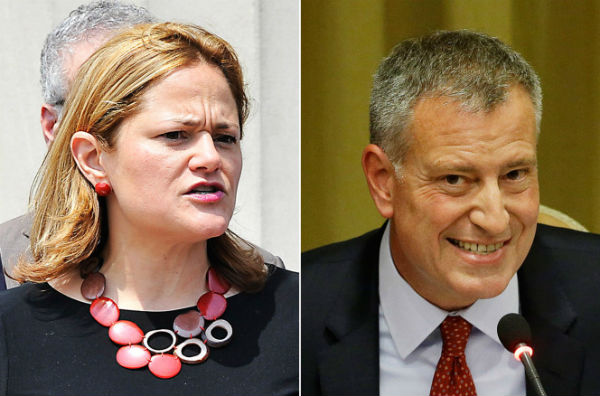 Mayor Bill de Blasio, Harlem City Council Speaker Melissa Mark-Viverito and others today held public hearings for, and signed, 12 pieces of legislation into law.
Mayor Bill de Blasio, Harlem City Council Speaker Melissa Mark-Viverito and others today held public hearings for, and signed, 12 pieces of legislation into law.
That legislation included – Intro.1017-C, in relation to strengthening protections for freelance workers; Intros.464-A and 796-A, in relation to promoting absentee voting amongst jailed individuals and requiring City agencies participating in the agency-based voter registration program to assist applicants completing the organ donation section; Intro. 83-A, in relation to requiring the NY Police Department to publicly post reports concerning cardiopulmonary resuscitation and automated external defibrillator retraining and reporting; Intros. 1187-A, 1190-A, 1191-A, 1192-A, 1197-A, 1199-A and 1205-A, in relation to amending local laws around foster care; and Intro. 1242, in relation to the establishment of the Greater JFK Business Improvement District.
“Freelance workers play a critical role in the economic strength and vitality of this city,” said Mayor Bill de Blasio. “With these new protections, freelance workers will have more confidence that they will be paid in a timely manner for their work, and if they are not paid, they will have a path to pursue full reimbursement for their labor. This is just one of many steps we are taking to ensure that workers’ rights are enforced and respected in this city.”
Protecting the vulnerable has always been a hallmark of New York City, and the legislation being signed into law today reflects just how many groups of people we are committed to championing…
“Protecting the vulnerable has always been a hallmark of New York City, and the legislation being signed into law today reflects just how many groups of people we are committed to championing,” said Harlem City Council Speaker Melissa Mark-Viverito. “Whether through organ donation provisions or CPR and AED training requirements for the NYPD, these bills will literally save lives. Through working with children in the foster care system to create a package of legislation that speaks to their needs, even the youngest among us will see their worlds changed for the better. By establishing legal protections for freelance workers and requiring absentee ballots be made available to the incarcerated, residents across the city gain new ways to ensure they can stand up for their rights. These initiatives make us a stronger, safer and more transparent city, and I thank the City Council and Mayor de Blasio for seeing these measures through to signing.”
The first bill, Intro. 1017-C, expands the protections available to freelance workers. This bill requires a written contract be created when a freelancer completes $800 or more worth of work for a hiring party. Additionally, it provides freelancers with additional monetary remedies if a hiring party tries to avoid paying the freelancer, which would be in violation of the agreement. In his remarks, the Mayor thanked the bill’s sponsor, Council Member Brad Lander.
“Freelancers are a vital and growing part of today’s workforce. The Freelance Isn’t Free Act will help ensure that they are paid on time and in full for work they’ve completed,” said Department of Consumer Affairs Commissioner Lorelei Salas. “We are proud to have worked very closely with the City Council on the final version of this bill, and our new Office of Labor Policy and Standards will be developing tools and providing resources to both freelancers and hiring parties to help them understand their rights and responsibilities under this new law. This law also provides us with an opportunity to examine the trends in New York City’s gig economy and to promote policies that will benefit our evolving workforce.”
“Today, New York City is becoming the first city in the nation to protect freelancers and independent contractors from getting stiffed,” said Council Member Brad Lander. “This means new protections for New York City’s 1.3 million freelancers – for people like Elizabeth McKenzie, a freelancer in film production who lived on bread and rolls, and worked in the dark because she couldn’t pay her utility bills after getting stiffed for $2,500 she had earned. Like Mauricio Niebla, part of a group of 40 writers and editors cheated out of a total of $400,000 by a national publishing company. Like Just Raymona, a pattern-maker from the Bronx, who paid the people she owed out of her savings when she was stiffed, but couldn’t pay her own rent or phone bill. The Freelance Isn’t Free Act will make sure all workers can get paid for their work, on-time and in full. Thank you to the Freelancers Union for their leadership, and to Mayor de Blasio, Speaker Mark-Viverito, and my Council colleagues for helping NYC lead the way in writing new rules for the economy, so all workers have the supports and protections they deserve.”
Today, we’ll be the first city in the country to establish groundbreaking protections to make sure freelancers get paid for the work they do…
“Independent workers are one of the fastest growing sectors of the workforce and the backbone of New York City’s economy. Today, we’ll be the first city in the country to establish groundbreaking protections to make sure freelancers get paid for the work they do,” said Freelancers Union Founder and Executive Director Sara Horowitz. “This legislation represents a major turning point for the gig economy, and I’d like to thank Mayor de Blasio, Speaker Mark-Viverito and the City Council for their vision and leadership in helping create a new safety net work for our city’s independent workforce.”
The second bill, Intro. 464-A, requires the Department of Correction to promote absentee voting among jailed individuals. People who have been involved in the criminal justice system are often misinformed about their eligibility to vote. This bill offers assistance to pre-trial detainees and those who are serving misdemeanor sentences and are eligible to vote. In his remarks, the Mayor thanked the bill’s sponsor, Council Member Ruben Wills.
“Although Introduction 464-A does not represent a cure-all for the disenfranchisement of the incarcerated, it is a significant step towards achieving greater equality for those who are too poor to arrange bail and cast their ballot at their actual poll site,” said Council Member Ruben Wills. “I thank the Council’s Governmental Operations Committee Chair Ben Kallos and the de Blasio Administration for supporting this legislation. We must continue to work towards ending the disenfranchisement of the nearly 100,000 individuals in New York State who have a felony conviction.”
“New York State should foster and encourage voter participation from all eligible citizens,” said Council Member Ben Kallos. “By providing absentee ballots to jailed persons who are eligible to vote, New York City will go a long way in making sure these citizens are not disenfranchised. With New York State’s consistently low voter turnout, we should be in the business of making sure as many people vote by facilitating the process, not impeding it. Thank you to Council Member Wills for his leadership and action helping people who have been incarcerated or are behind bars to vote, and thank you to Mayor de Blasio for his support is making this law.”
The third bill, Intro. 796-A, requires assistance be given if requested by individuals signing up to be organ donors as part of the agency-based voter registration program. Since 2009, the New York State voter registration form has included an optional section for individuals to enroll as an organ and tissue donor. To save more lives, various measures need to be implemented to increase enrollment of organ donors. This bill mandates that City agencies participating in the agency-based voter registration program provide assistance to applicants on the organ donation section, if assistance is requested. In his remarks, the Mayor thanked the bill’s sponsor, Council Member Costa Constantinides.
Council Member Costa Constantinides said, “Our state ranks 50th out of 50 in percent of residents who are registered organ donors. More needs to be done to encourage people to donate and to combat this public health crisis. This legislation makes it easier for people to register by providing assistance as part of our city’s agency-based voter registration program. I am proud to raise awareness about this desperate need. I thank Mayor de Blasio and my Council colleagues for their support of this important health policy.”
The fourth bill, Intro. 83-A, requires the Police Department to retrain its officers in cardiopulmonary resuscitation (CPR) and automated external defibrillator (AED) and publicly post reports concerning CPR and AED retraining and reporting. Currently, NYPD officers and school safety agents receive CPR and AED training. CPR and AED techniques are potentially life-saving measures, especially in critical situations. This bill will require both retraining and public reporting on these trainings annually. The data will capture the training of all officers assigned to patrol precincts, transit districts and police service areas as well as all school safety agents. The report will also be broken down by total number of trained, newly-trained and retrained police officers and school safety agents each year. This bill will reflect the efforts on the part of the NYPD to ensure this important provision of life-saving assistance is implemented throughout the five boroughs. In his remarks, the Mayor thanked the bill’s sponsor, Council Member Stephen Levin.
Police Commissioner James P. O’Neill said, “Today’s legislation reinforces the Police Department’s commitment to providing our officers and school safety agents with the knowledge and skills necessary to carry out their important public safety mission for all New Yorkers, including the ability to render aid in the event of a medical emergency.”
“In order to save lives, New York’s finest must receive the highest quality training in life-saving CPR and AED skills. These are commonsense measures that would help to improve the chance of survival for victims of cardiac arrest. They ensure that first responders are well-equipped to respond with speed and skill so that they can continue to protect and serve New Yorkers,” said Council Member Stephen Levin.
The fifth bill, Intro. 1187-A, requires the Administration for Children’s Services to report on whether youth currently in foster care and those who have recently aged out of care have government-issued identification. In his remarks, the Mayor thanked the bill’s sponsor, Council Member Daniel Dromm.
“Providing foster care youth with identification sets them off on a path to becoming successful adults,” said Council Member Daniel Dromm. “Ensuring that the Administration for Children’s Services works with young people to ensure that they secure identification will now be a function of this agency. I am proud to have worked closely with this administration to help youth.”
The sixth bill, Intro. 1190-A, requires the Administration for Children’s Services to submit annual reports on the educational stability of children in foster care. In his remarks, the Mayor thanked the bill’s sponsor, Council Member Stephen Levin.
The seventh bill, Intro. 1191-A, requires the Administration for Children’s Services to submit a five-year plan to address barriers to permanency for youth in foster care. This plan will include a case study of a statistically significant sample of children who spent at least two years in foster care, as well as an analysis of how ACS plans to address any systemic barriers to permanency identified during the case study. In his remarks, the Mayor thanked the bill’s sponsor, Council Member Stephen Levin.
The eighth bill, Intro. 1192-A, creates a foster care task force. This task force will develop and submit recommendations for improving services for youth in foster care and outcomes for youth aging out of foster care. The task force will be made up of representatives from ACS, DSS, DOE, DYCD, DOMHM, NYCHA, the City Council, the Public Advocate, foster care providers, advocacy organizations, youth who are currently in foster care or who have recently aged out of foster care and a parent with previous child welfare involvement. In his remarks, the Mayor thanked the bill’s sponsor, Council Member Stephen Levin.
“Children and youth in the City’s care are some of the most vulnerable New Yorkers and it is our collective responsibility to ensure that each of them has a safe, loving home and access to comprehensive services. These bills are especially important because many of them are a direct response to the firsthand experiences of youth in care. I look forward to continuing to work with young people, advocates, agencies and colleagues in the City Council and Administration to improve how our City protects and provides for our children,” said Council Member Stephen Levin.
The ninth bill, Intro. 1197-A, requires the Administration for Children’s Services to report on youth in foster care and youth that have recently aged out of foster care. In his remarks, the Mayor thanked the bill’s sponsor, Public Advocate Letitia James.
The tenth bill, Intro. 1199-A, requires the Administration for Children’s Services to provide to all youth in foster care ages 13 and older an annual survey regarding their experiences in foster care. The survey will include questions about youth’s experiences in a wide range of topic areas, from access to food and clothing, to personal allowances, to education and extracurricular activities. In his remarks, the Mayor thanked the bill’s sponsor, Council Member Donovan Richards.
“After I participated in the City Council’s Foster Shadow program last year, it became clear that we need to do more as a City to protect and improve the lives of our foster children,” said Council Member Donovan Richards. “It is truly heartbreaking to hear the stories of foster youth being denied the simple things most children take for granted such as having access to food and clothing, permission to practice their religion, internet and phone access and personal allowances. This experience inspired my office to work on Intro 1199-A. This survey will help us make sure that the only foster parents in our system are those who have the best interest of every child in mind. I’d like to thank the de Blasio Administration, Speaker Mark-Viverito, Council Members Levin and Eugene, and the Administration of Children’s Services for all of their hard work in crafting this package of bills that will surely go a long way towards improving the lives of our foster children.”
The eleventh bill, Intro. 1205-A, requires the Administration for Children’s Services report on high school graduation rates of youth in foster care. In his remarks, the Mayor thanked the bill’s sponsor, Council Member Laurie Cumbo. Together, these seven foster care bills will provide greater transparency and accountability to the system and will help lead to greater insight into the outcomes of those who age out of foster care.
“Every youth, irrespective of their socioeconomic status or background, deserves an equal opportunity to succeed as scholars and professionals. With nearly 10,000 children and youth under the care of the Administration for Children’s Services, we must ensure that the proper resources are in place to support their continued growth and development within and beyond the foster care system. I am proud that my bill, Intro 1205, will enable us to assess the academic progression of high school-aged youth in foster care,” said Council Member Laurie A. Cumbo.
The twelfth bill, Intro. 1242, authorizes the creation of the Greater JFK Business Improvement District. BIDs are geographical areas where local stakeholders come together to fund and oversee the supplemental maintenance, promotion and improvement of a commercial district, thereby supporting local businesses and increasing the vitality of a neighborhood. The Greater JFK BID would be located in the industrial and mixed-use area of Springfield Gardens, a neighborhood adjacent to JFK airport that includes approximately 4.1 million square feet of commercial and industrial space. The BID will be a strong local advocate for the district that can help to address the unique challenges faced by the area’s local businesses and residents, while helping to better connect them to the City’s workforce development and business development programs. In his remarks, the Mayor thanked the bill’s sponsor, Council Member Julissa Ferreras-Copeland and local Council Members, Donovan Richards and Ruben Wills.
“The new Greater JFK Airport Business Improvement District will provide a strong voice for a neighborhood that is vital to our city’s economic success,” said Gregg Bishop, Commissioner of the Department of Small Business Services. “In order to compete in our global economy, New York needs to continue to invest in first-rate infrastructure and unlock economic potential in neighborhoods across our city.”
“JFK Airport is integral to the city’s economy as the second largest employer in Queens, and area stakeholders, civic groups and businesses play an equally vital role in helping to grow good jobs for the community,” said NYCEDC President Maria Torres-Springer. “The Greater JFK Business Improvement District will reinforce JFK Airport’s standing as a major global competitor, bolster our air cargo industry and catalyze economic growth for hundreds of businesses in Southeast Queens. I applaud SBS and the Greater JFK IBID Planning Committee for their hard work in making this exciting project a reality.”
“John F. Kennedy International Airport is already a key driver of the Queens economy and the creation of the Greater JFK Industrial Business Improvement District will help unlock the airport’s economic full potential as a job creator and a business multiplier for our borough,” said Queens Borough President Melinda Katz. “The Greater JFK IBID will deliver services and improvements that will allow the nearby businesses that service the airport to work better and more efficiently. The Department of Small Business Services and the New York City Economic Development Corporation deserve to be commended for spearheading the creation of the IBID, which will greatly improve the competitiveness of the businesses it will serve.”
“The Greater JFK BID seeks to build upon the area’s diversity and major economic significance by serving as an advocate and providing supplemental services and improvements that support a vision for a strong industrial base and improved quality of life for all who live, work or visit the District,” said Council Member Donovan Richards. “After two years, today is a very proud moment for my community and my office to finally get to this point and I’d like to thank Mayor de Blasio, Small Business Services, the SpringJam Block Association, UNCA, and Community Boards 12 and 13 for their partnership in making this plan come together. I’d also like to thank Council Member Julissa Ferreras and Rebecca Chasan from our Finance Division.”
“I am hopeful that the creation of an Industrial Business Improvement District for the Greater JFK region will provide tangible benefits for those of my South Jamaica constituents who live within its boundaries,” said Council Member Ruben Wills. “JFK itself is the single largest employer within my district. This authority’s establishment should enhance the economic vitality of its surrounding communities, but the true measure of this BID will ultimately depend on the inclusivity and diversity of its membership.”
Congressman Gregory W. Meeks said, “I commend the formation of the Greater JFK Business Improvement District, which will help enhance commerce closely associated with John F. Kennedy International Airport. My district’s economy and JFK are inextricably connected. Jamaica, Queens was severely hit by the recession in 2008. Retail jobs, health care jobs and small business jobs associated with JFK helped us eventually reach pre-recession employment numbers in 2012. As we continue to expand Jamaica’s economy, public-private partnerships and coordination are critical. This newly formed BID will bring together the best minds in the public and private sectors towards one goal: ensuring the positive development of our beloved community.”
State Senator James Sanders Jr. said, “JFK has incredible potential as a commercial hub and its economic success is important for the residents of Southeast Queens, many of whom work at the airport or in related industries. It is also critical for the more than 600 businesses that are supported by JFK. I believe the creation of the JFK Business Improvement District is a positive move. By uniting stakeholders and allowing them to work collectively in advocating for investments in infrastructure, public safety, quality of life improvements and increased job creation, the entire community will benefit.”
“The signing of legislation by Mayor Bill de Blasio creating the JFK IBID is an important achievement for both citizens and businesses in Queens Community Board 13. Through the cooperation of the resident community led by Spring Jam Civic Association along with the imbedded air freight, customs brokers, truckers and logistical service providers, local government came together to provide the structure necessary to protect all of these stakeholders. Queens Community Board 13 looks forward to working with the JFK IBID as a partner in assuring the necessary city services are delivered to all who live and work in this community,” said Mark McMillan, CB13 District Manager.
“The formation of the JFK BID provides a landmark opportunity for the residential homeowners and tenants represented by Spring Jam Block Association, UNCA, and other community organizations. These organizations will collaborate with commercial tenants, as well as government agencies with respect to the District’s needs of this unique but underserved district. During the formation of the JFK BID not only has the communication increased, relations have been formed and in some cases been strengthened but transparency has been exercised in a light most favorable to the community. The JFK BID is a blessing to this District and as President of Spring Jam Block Association, as well as one of the Co-Chairs of the JFK BID planning committee, I would like to thank and congratulate all of the key players who made it happen,” said Kim Lawton, co-Chair of the Greater JFK BID and Spring Jam Block Association.
“I would like to thank the City of NY and all the respective Agencies for their efforts in supporting the formation of the JFK IBID and recognizing the need to improve upon the neighborhood that supports the 1.3 Million Tons of Cargo traversing through JFK Int. Airport,” said Frank Liggio, co-Chair of the Greater JFK BID and CBRE, Inc.
“I am very proud of the volunteers of the BID Planning Committee as they worked together to recognize shared concerns and to seek making this unique New York City neighborhood overlooked and misunderstood no more,” said Barbara Cohen, BID consultant.
Become a Harlem Insider!
By submitting this form, you are consenting to receive marketing emails from: Harlem World Magazine, 2521 1/2 west 42nd street, Los Angeles, CA, 90008, https://www.harlemworldmagazine.com. You can revoke your consent to receive emails at any time by using the SafeUnsubscribe® link, found at the bottom of every email. Emails are serviced by Constant Contact



